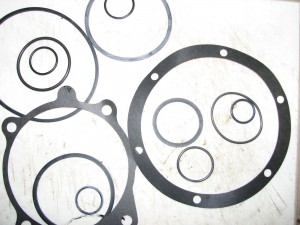Water can find its way into an automatic transmission in several ways. The one you’re probably most familiar with is through the transmission cooler in the radiator You don’t have to be in the business long to become ac quainted with the “strawberry milkshake” in the radiator. But what can be even worse is when a tiny amount – sometimes less than a thimble full – finds its way into the transmission.
All too often, customers forget to flush the cooling system and replace the antifreeze. The term “permanent antifreeze” confuses a lot of car owners – … permanent … in this case, means… year round, not never needs replacing….
Three, four, five years. – acids build up in the coolant – ’til the transmission heat exchanger welds begin to corrode. It doesn’t have to be a big hole… in fact, most of the time the hole is so small that ATF won’t even get into the radiator.
But the antifreeze solution is not this obvious… you may not even realize that water found its way into your transmission. And even a few drops can be deadly to your automatic transmission. greater surface tension than ATF, and as the radiator builds up pressure, it forces the antifreeze solution through the pinholes or cracks into the cooler. Once there, it mixes with the ATF, and creates that milky, pink-colored sludge you’re familiar with. By the time the fluid reaches this point, chances are pretty good the transmission’s about shot.
And neglect’s not the only reason for the transmission heat exchanger to fail. Any time you have a liquid in contact with different metals, a chemical reaction takes place, known as electrolysis. Electrons carry atomic metal from one type of metal to another in a process very similar to metal plating. This can occur at brazed joints in a heat exchanger. And the heat in an automobile radiator makes it even worse – accelerating the failure.
As countless electrons flow away from the brazed joints, the joints weaken and pit. More and more pits develop, and the continual heating and cooling of the radiator stresses the weakened joints, causing microscopic cracks between the coolant tank and the transmission heat exchanger.
New fluid can actually cause water damage!
Just because you didn’t see any sign of water damage during a rebuild doesn’t mean you’re off the hook…
You just installed arebuilt transmission and flushed the cooler. Now the cooler’s clear, and the pump’s pushing fresh ATF – under pressure – through the cooler. Fresh ATF that’s loaded with active dispersants and detergents,
As these active ingredients flow through the cooler, they come in contact with those hairline cracks or pinholes. So even though the unit didn’t come in with a water problem, that water problem won’ t be long in coming, as fresh ATF washes away the varnish and sludge that blocked the crack.
And no matter how good a job you do rebuilding the unit, if you don’t fix the water problem, your rebuild won’t last. But a bad heat exchangers just one way for water to get in and destroy your transmission.
There are others.
One good pass through a deep puddle can soak the unit’s insides. Or how about the car stalling in a flash flood rainstorm – at the low spot in the road? And don’t forget when the kids decide to play “service station” with the garden hose!
Even the over-zealous car wash attendant with a steam cleaner can soak your transmission’s insides.
Here’s something that’s shown up a couple of times on VW’s and Mercedes – a bad hood seal, which allows water to find its way down to the transmission vent. The vents on these units sit in a valley, and when the valley fills with water, so can the transmission.
And while water can sometimes find its way into a transmission through the vent, a clogged vent can lead to water damage, too.
As the transmission heats up, any condensation that found its way into the unit boils off and turns to water vapor. That vapor is supposed to find its way out the vent, to keep the transmission from becoming contaminated. But if the vent gets clogged, the vapor can’t dissipate – instead, it turns the transmission into a kind of pressure cooker – an apt analogy, considering it cooks the transmission!
..you may not even realize that water found its way into your transmission. So there are plenty of ways for water to find its way into the transmission.
No problem, right? Just drain it out, and replace the fluid, right? Not necessarily! You’ve got to determine how the water got there in the first place, and take care of that problem – otherwise, as fast as you drain it out, it’ll be right back in. If it was the kids playing “gas station,” or you got caught in a flash flood, you might luck out… if you get the car towed to a shop and drain the fluid out before you start the engine! Once you’ve started the engine, forget it – it’s too late to save the transmission – you’ll have to overhaul the transmission to get all the water out.
GotTransmissions.com @ 866-320-1182




